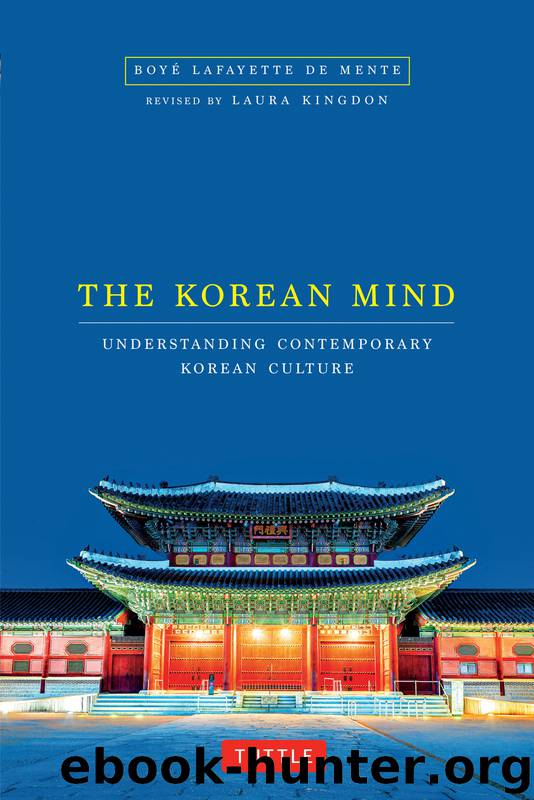The Korean Mind by Boye Lafayette De Mente

Author:Boye Lafayette De Mente
Language: eng
Format: epub
Publisher: Tuttle Publishing
Komun 고문 Koh-muun
Getting Good Advice
Because education in pre-modern Korea was generally limited to male members of the elite upper class, the only people in the country who were in a position to become experts at anything beyond manual skills were members of the gentry. All government officials in Korea were selected from the elite educated class. Many of the gentry who did not receive or solicit appointments to government positions became professional scholars and spent their lives studying, teaching, and dispensing advice. These men came to be venerated by the people, sometimes to the point of being regarded as saints.
This built-in admiration for scholarship and for experts was carried over into industrial Korea but with a twist. In the early decades of Korea’s rise to economic prominence there was very little understanding or appreciation for the concept of intellectual property or for the concept of paying outside jeonmunga (juhn-muun-gah), “experts” or “professionals,” for advice. For years the common practice was to take every possible advantage of the expertise of outsiders—friends and even casual contacts—to get as much professional advice as possible from them without any thought of payment. Visiting foreigners, regardless of their field, were looked on as free sources of business information. Those with technical knowledge in particular were expected to reveal everything they knew, including what they regarded as proprietary information, to their Korean contacts.
By the 1980s, however, the executives of most larger Korean firms had made the quantum leap from a preindustrial mentality to a very modern approach to using foreign consultants, engineers, and scientists, retaining large numbers of them, and paying them well—something they learned and adapted to much more quickly than the Chinese and Japanese.
Foreign companies making their initial approach to Korea are strongly advised to qualify and retain a komun (koh-muun), or “consultant-adviser,” to guide them through the cultural and political mazes. Broadly speaking, there are two kinds of komun in Korea. First is the professional consultant who bases his insights and advice on native cultural wisdom, research, and scholarship in general. Second is the formerly successful businessman or bureaucrat, turned consultant as a second career. These latter individuals may be referred to as yuryukja (yuu-ryuke-jah), or “a person with influence,” meaning someone who has the clout to get things done.
In Korea retired government officials and high-level corporate executives do not automatically become nonpersons the moment they retire, as is usually the case in the United States and elsewhere in the West. Their successors, who are usually their handpicked followers, fulfill their Confucian-oriented obligations to them by continuing to take their advice and doing favors for them—knowing that when their turn comes to retire, their successors will continue the custom.
Generally speaking, the professional komun is the most valuable to start up companies, particularly in fashioning employment contracts, hiring, and employee training. Yuryukja render the most valuable service in helping companies resolve problems with the government and in initiating high-level relationships with other companies. Yuryukja with high, positive public profiles are often capable of accomplishing small miracles on behalf of their clients.
Download
This site does not store any files on its server. We only index and link to content provided by other sites. Please contact the content providers to delete copyright contents if any and email us, we'll remove relevant links or contents immediately.
| Africa | Americas |
| Arctic & Antarctica | Asia |
| Australia & Oceania | Europe |
| Middle East | Russia |
| United States | World |
| Ancient Civilizations | Military |
| Historical Study & Educational Resources |
The Sympathizer by Viet Thanh Nguyen(4381)
The Rape of Nanking by Iris Chang(4193)
World without end by Ken Follett(3468)
Ants Among Elephants by Sujatha Gidla(3452)
Blood and Sand by Alex Von Tunzelmann(3183)
Japanese Design by Patricia J. Graham(3159)
The Queen of Nothing by Holly Black(2577)
City of Djinns: a year in Delhi by William Dalrymple(2543)
Foreign Devils on the Silk Road: The Search for the Lost Treasures of Central Asia by Peter Hopkirk(2453)
India's Ancient Past by R.S. Sharma(2441)
Inglorious Empire by Shashi Tharoor(2427)
Tokyo by Rob Goss(2423)
In Order to Live: A North Korean Girl's Journey to Freedom by Yeonmi Park(2373)
Tokyo Geek's Guide: Manga, Anime, Gaming, Cosplay, Toys, Idols & More - The Ultimate Guide to Japan's Otaku Culture by Simone Gianni(2356)
India's biggest cover-up by Dhar Anuj(2343)
The Great Game: On Secret Service in High Asia by Peter Hopkirk(2327)
Goodbye Madame Butterfly(2243)
Batik by Rudolf Smend(2173)
Living Silence in Burma by Christina Fink(2058)
